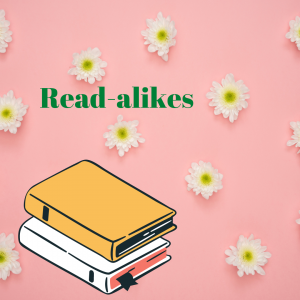 Because of my years of experience running book clubs, I have somewhat of a reputation. My friends and family jokingly call me a walking encyclopedia of books––a side effect of reading across genres and tastes for many years. This semester, I decided to put this skill to use by taking the class Reading Interests of Adults, which teaches us how to provide readers’ advisory services to adult patrons.
Because of my years of experience running book clubs, I have somewhat of a reputation. My friends and family jokingly call me a walking encyclopedia of books––a side effect of reading across genres and tastes for many years. This semester, I decided to put this skill to use by taking the class Reading Interests of Adults, which teaches us how to provide readers’ advisory services to adult patrons.
Historically, there has been a slight shift in the role of the readers’ advisor. Originally, many librarians thought this role should be to improve the taste of the patron. However, now we recognize that our role is to suggest books that patrons will enjoy! We suggest books that patrons will truly want to read. To do this, we typically ask patrons what they’re looking for in a book and what books they have enjoyed in the past. In my readers’ advisory course, I was able to draw on my own experience as a reader to understand the process of recommending books. As a reader, I know there have been times when I put down a book and immediately wanted to find another just like it. Usually, I enjoy books that give me similar experiences. To find a read-alike, you must consider the appeal factors of the novel that contribute to the overall experience of reading it. This can include pacing, characterization, plot, themes, and writing style. These elements work together to create a certain feeling for the reader.
For example: I recently read (and loved!) the novel If We Were Villains by M. L. Rio. After he is released from a ten-year jail sentence, the main character reflects on his time as a student in a school for performing arts and the murder of his classmate. Here is a breakdown of the elements that I found contributed the most to the overall feeling of this novel.
Characters: This novel centers around Oliver and his six classmates, who all fulfill the roles of various Shakespearean archetypal characters. Each of these characters are flawed and complex, yet sympathetic.
Plot: Oliver recounts the murder of his classmate and the mystery surrounding it. Although it is a thriller, this novel unfolds at a leisurely pace, providing rich detail about the setting and lives of the characters. The plot is also gripping and character-driven.
Themes: This novel contains darker themes including greed, envy, lust, and obsession. Notable features include the location and time period, 1990s Ohio at an elite school for acting. The backdrop and dramatic themes make this a moody novel.
Writing Style: The writing style is incredibly lyrical––characters tend to think and speak lines from Shakespearean dramas.
As soon as I finished reading If We Were Villains, I immediately wanted more of the experience. So after some searching, I found a similar book: The Secret History by Donna Tartt. This novel is also set at an elite college, centering around a small group of classmates who devote themselves to their studies. The characters are also flawed and complex, and there is a death. Overall, I believe it will produce a similar experience.
Websites you can use to find read-alikes include Goodreads, What Should I Read Next?, and NoveList. If you look up a book on Goodreads, the websites will automatically show you books that are similar. You can also see lists created by users which contain the book. When users create their own lists, this can be a form of informal readers’ advisory. If We Were Villains appears on lists such as “Dark Academia,” “Secret History-esque Books,” and “Shakespeare Retellings.” What Should I Read Next? provides a simple list of books that are similar to your entry, tagging each book with relevant terms. NoveList is a readers’ advisory database for libraries, and it is a subscription-based service. The New Jersey State Library provides access to all residents of New Jersey. When searching for a book, this database provides a list of read-alikes curated by librarians or algorithms and an explanation of why the two books are similar.
Reading is a personal experience. If you’ve recently finished a book that you absolutely love, I hope that you can use these tips to find something new!
![If We Were Villains: A Novel by [M. L. Rio]](https://m.media-amazon.com/images/I/411eJEeZdOL.jpg)
